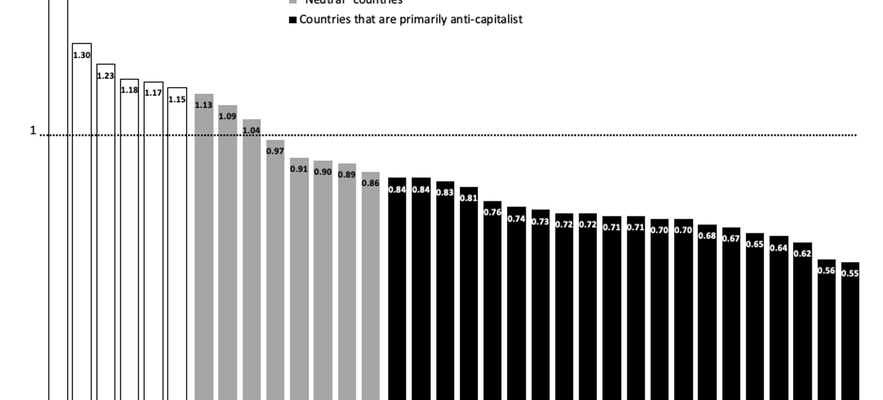Barely less anti-capitalist than Greece, Montenegro or Russia… And very far behind states like Vietnam, Nigeria, South Korea or Poland. Published by the British think tank Institute of Economic Affairs (IEA), with a liberal tendency, a study confirms that France is one of the most anti-capitalist countries in the world. Its author, the German sociologist and historian Rainer Zitelmann, surveyed opinions in 34 countries on all continents. This is the largest and most detailed survey ever carried out on this subject in the world. Representative samples of approximately 1,000 people were surveyed in each country. In total, 34,550 people participated in the survey.
In order to avoid the prejudices linked to the word “capitalism”, Rainer Zitelmann first tested a series of statements about economic freedoms, such as “We need much more state intervention in the economy, because the market continually fails” or “I am for an economic system in which the State sets the rules, but, ideally, does not intervene otherwise”. From these results, he calculated an “economic freedom” coefficient for each country. Poland is by far the country most supportive of a free market system, followed by the United States and the Czech Republic. Conversely, Russia, Bosnia-Herzegovina, Turkey and Pakistan are those most in favor of a state-controlled economy. With a score of 0.67, France is in 29th place, behind Albania.
Vietnam, this socialist country that loves the market
Then, Rainer Zitelmann asked those interviewed to associate terms with the word “capitalism”, some positive (“prosperity”, “innovation”…), others negative (“greed”, “corruption”…). He also tested different statements (“Capitalism is responsible for hunger and poverty”, “Capitalism has improved the living conditions of ordinary citizens in many countries”…). By combining all the data, the sociologist classified the 34 countries according to their positioning in relation to capitalism. France ranks 29th, proof that the negative connotation of the word “capitalism” further strengthens distrust of the free market. Only Greece, Montenegro, Russia, Bosnia-Herzegovina and Turkey are more anti-capitalist. The countries most favorable to capitalism are Poland, the United States, South Korea, Japan, Nigeria and the Czech Republic.
Positioning in relation to capitalism in 34 countries.
© / Allensbach Institute / Ipsos Mori
We can observe that the countries of Eastern Europe (Poland, Czech Republic, but also Romania), undoubtedly vaccinated by their communist experiences under the Soviet yoke, appear in number among the nations supporting or having a neutral attitude by relation to capitalism. Asian countries, major beneficiaries of globalization in recent decades, are overwhelmingly pro-capitalist. It is also ironic to note that Vietnam, still in the hands of an authoritarian Communist Party, ranks among the most pro-capitalist states in the world. “The word ‘capitalism’ has positive connotations in Vietnam, even if the country calls itself ‘socialist’, because the Vietnamese experienced the market economy reforms of the dôi moï [le renouveau]which began in 1986″, notes Rainer Zitelmann. Since this date, GDP per capita has increased sixfold in Vietnam. In 2022, growth reached 8%, confirming that the country has one of the most dynamic Asian economies of the moment.
Nigeria is also resolutely pro-capitalist. “The fact that Nigerians have such a positive view of capitalism may be surprising, especially since they also have a negative view of the market economy. But in Nigeria, capitalism is simply a word of hope : the inhabitants of this developing country associate it with the type of prosperity they see in Western countries”, assures the sociologist. Also in Uganda, the statement that “capitalism is responsible for hunger and poverty” was the most unpopular among the 18 sentences submitted to respondents.
In France, very anti-capitalist extremes
On the other hand, the countries of Western Europe are overwhelmingly opposed to capitalism. While Sweden maintains a neutral stance, Italy, the United Kingdom, Germany, Austria, Portugal, the Netherlands and Spain all rank among the “primarily anti-capitalist” countries. But, even in this context, France stands out for its anti-capitalist attitude. In our country, the statement that capitalism leads to growing inequality received the most approval, tied with the phrase “Capitalism is dominated by the rich, they set the political agenda.”
In France, politically, the most pro-capitalist people are found in the center and center right. Even supporters of the moderate left are strongly opposed to it, while the far left is one of the most anti-capitalist in the world, on a par with that of the United Kingdom. French far-right voters also have a particularly negative position regarding the free market compared to other countries. Only supporters of the Italian, Bosnian or Montenegrin extreme right are more hostile.
The study reveals that age plays almost no role in pro or anti-capitalist positioning in France, while the generational effect is important in a nation like the United States, where seniors overwhelmingly support capitalism, unlike young people. .
We can see in this study a confirmation that anti-capitalism has, in Western Europe, and particularly in France, all of a luxury belief. As recalled by the economist Guillaume Bazot, lecturer at the University of Paris VIII and author of The neoliberal Scarecrow, a very French evil (PUF): “We see anti-capitalist discourse flourishing in the media. Also in the polls, the French say they are mostly anti-capitalist. But, at the same time, private property remains a cardinal value for them, as evidenced by their massive opposition to taxation on inheritances. There is thus a real contradiction between the speeches and the way in which the French act. Nobody really thinks that capitalism is going to stop. Nobody is thinking of what a possible cessation of capitalism to move to a collectivist system could imply for its own standard of living.”
